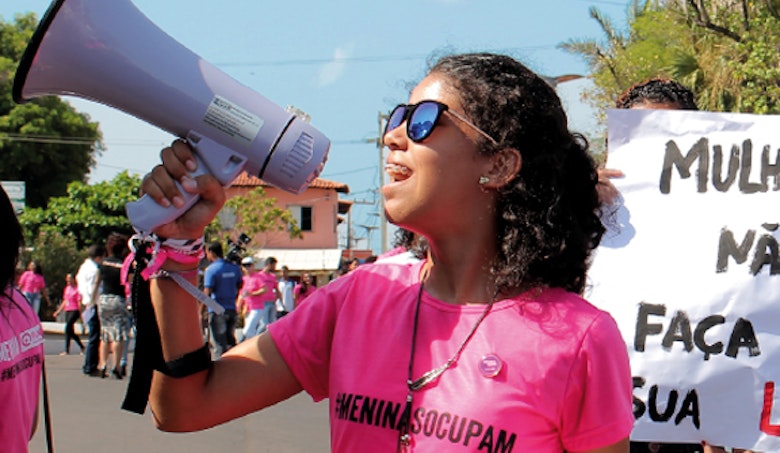Girls Advocacy Alliance
The Girls Advocacy Alliance is committed to fighting violence against girls and young women and increasing their economic participation in developing countries. Violence and economic exclusion are closely linked. Particularly due to child marriages, sexual violence, trafficking in women, and the worst forms of child labour, girls are dropping out en masse in secondary and vocational education. Their chances of ever getting a 'decent' job are minimal. And in turn, without income and independence, they are more vulnerable to violence.
Latest news
Today I Follow, Tomorrow I Lead
Christian was born on December 12, 1997, the eldest among nine siblings. His father works as a street cleaner.…
Breaking the stereotype: Boys lead the movement in promoting Gender Equality
If it’s a movement for gender equality, it’s usually women and girls who are in the forefront. They are the on…
Advocating against Child Trafficking in Olongapo City, Philippines
In preparation for World Day Against Human Trafficking in July 2019, the BUKLOD Women Center formed a voluntee…
Advocacy inspires Action
“Advocacy really inspires action”, says Ms. Bathula Karuna, a project staff of Terre des Hommes Netherlands’ G…
Approach
Within this alliance, Terre des Hommes focuses mainly on the themes of child trafficking and sexual exploitation, Plan Nederland focuses mainly on the lobby around child marriages and economic opportunities for girls and young women (education and work) and Defence for Children-ECPAT focuses on combating sexual violence and child abuse.
The local partners in the Girls Advocacy Alliance work on the themes in the following ways:
- ensuring that influential leaders of the local community promote values and norms that put girls in a positive light and stimulate their development in society.
- supporting civil society organisations and networks in the lobby to stop violence against girls and economic exploitation.
- encouraging the business community to actively work to combat violence against girls in their business chain by providing safe workplaces and better working conditions for girls.
- advocating for more effective implementation of legislation and public policies to protect girls and young women and improve their economic position, in line with human rights conventions.
We fight child marriages, sexual violence and child labour
The UN Convention on the Rights of the Child states that all children, everywhere in the world, have the same rights. Yet a large proportion of girls in developing countries are disadvantaged and discriminated against. Child marriages, sexual violence, trafficking in women, child labour; it all causes girls to drop out en masse in secondary and vocational education. As a result, their chances of earning their own income later on become minimal. Without an income and independence, these girls and young women are more vulnerable to exploitation and violence.
In the Girls Advocacy Alliance (GAA), Terre des Hommes works together with the organisations Plan Netherlands and Defence for Children - ECPAT to eliminate violence against girls and young women and to strengthen their economic opportunities in society. The programme runs from 2016 - 2020 and is implemented in ten countries: Ethiopia, Sierra Leone, Liberia, Ghana, Kenya, Uganda, India, Bangladesh, Nepal and the Philippines.
Goals
Through capacity support to local partners, strengthening networking, research and lobbying and advocacy, the three organizations in the GAA aim to achieve the following results by 2020:
Our approach is working
2020, the final year of the programme, is dedicated to sustaining the results achieved for girls and young women. In the programme countries and at international level. At the same time, we are working in the ten countries to expand and strengthen the partnerships and to further build the capacity of the (local) organisations involved, civil society, communities, religious and local leaders and, of course, the young people themselves. In this way, we will ensure that the position and rights of girls and women continue to improve beyond 2020.
"Equal rights for all human beings should not be an ideal to strive for; it should be the foundation of our society. We must each do our part in creating a world where all persons have the capability and freedom to choose the life that is right for them." Contact Henriette: h.kristiansen@tdh.nl
Final 2020 Annual Report
This final GAA Annual report covers the period January 2016 – December 2020, with a specific focus on the progress of the programme last year, January – December 2020.
It assesses the progress of the Girls Advocacy Alliance programme towards its objectives and considers the program’s effectiveness. In addition, the report includes information on the indicators for Strategic Partnerships under the Dialogue & Dissent framework that were introduced by the Ministry of Foreign Affairs in October 2017. It also explores changes in the external context and reflects on the relevance and validity of the program’s Theory of Change.
Final Learning Review Report
The Learning Review report concludes that the Girls Advocacy Alliance programme adopted a flexible, adaptive approach in supporting youth advocates. This enabled the programme to respond to young people’s needs, and to become more youth-centred.
The report also highlights the importance of articulating youth advocates’ role and contribution from the onset: to ensure capacity support and tools, resources, and frameworks that are adapted to the cultural context and advocacy level of youth advocates; to carefully consider the meaningfulness of various forms of participation (e.g. high-level international events); and to incorporate follow-up after engagement in (international) advocacy opportunities in all work with youth advocates.
The GAA programme formally ended in the end of December 2020.

